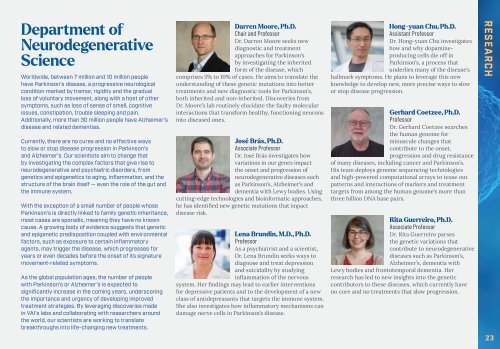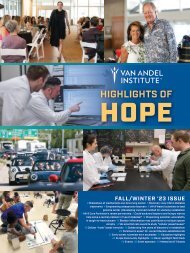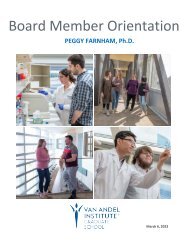2022 Annual Report
This is the 2022 Annual Report for Van Andel Institute.
This is the 2022 Annual Report for Van Andel Institute.
You also want an ePaper? Increase the reach of your titles
YUMPU automatically turns print PDFs into web optimized ePapers that Google loves.
Department of<br />
Neurodegenerative<br />
Science<br />
Worldwide, between 7 million and 10 million people<br />
have Parkinson’s disease, a progressive neurological<br />
condition marked by tremor, rigidity and the gradual<br />
loss of voluntary movement, along with a host of other<br />
symptoms, such as loss of sense of smell, cognitive<br />
issues, constipation, trouble sleeping and pain.<br />
Additionally, more than 30 million people have Alzheimer’s<br />
disease and related dementias.<br />
Currently, there are no cures and no effective ways<br />
to slow or stop disease progression in Parkinson’s<br />
and Alzheimer’s. Our scientists aim to change that<br />
by investigating the complex factors that give rise to<br />
neurodegenerative and psychiatric disorders, from<br />
genetics and epigenetics to aging, inflammation, and the<br />
structure of the brain itself — even the role of the gut and<br />
the immune system.<br />
With the exception of a small number of people whose<br />
Parkinson’s is directly linked to family genetic inheritance,<br />
most cases are sporadic, meaning they have no known<br />
cause. A growing body of evidence suggests that genetic<br />
and epigenetic predisposition coupled with environmental<br />
factors, such as exposure to certain inflammatory<br />
agents, may trigger the disease, which progresses for<br />
years or even decades before the onset of its signature<br />
movement-related symptoms.<br />
As the global population ages, the number of people<br />
with Parkinson’s or Alzheimer’s is expected to<br />
significantly increase in the coming years, underscoring<br />
the importance and urgency of developing improved<br />
treatment strategies. By leveraging discoveries made<br />
in VAI’s labs and collaborating with researchers around<br />
the world, our scientists are working to translate<br />
breakthroughs into life-changing new treatments.<br />
Darren Moore, Ph.D.<br />
Chair and Professor<br />
Dr. Darren Moore seeks new<br />
diagnostic and treatment<br />
approaches for Parkinson’s<br />
by investigating the inherited<br />
form of the disease, which<br />
comprises 5% to 10% of cases. He aims to translate the<br />
understanding of these genetic mutations into better<br />
treatments and new diagnostic tools for Parkinson’s,<br />
both inherited and non-inherited. Discoveries from<br />
Dr. Moore’s lab routinely elucidate the faulty molecular<br />
interactions that transform healthy, functioning neurons<br />
into diseased ones.<br />
José Brás, Ph.D.<br />
Associate Professor<br />
Dr. José Brás investigates how<br />
variations in our genes impact<br />
the onset and progression of<br />
neurodegenerative diseases such<br />
as Parkinson’s, Alzheimer’s and<br />
dementia with Lewy bodies. Using<br />
cutting-edge technologies and bioinformatic approaches,<br />
he has identified new genetic mutations that impact<br />
disease risk.<br />
Lena Brundin, M.D., Ph.D.<br />
Professor<br />
As a psychiatrist and a scientist,<br />
Dr. Lena Brundin seeks ways to<br />
diagnose and treat depression<br />
and suicidality by studying<br />
inflammation of the nervous<br />
system. Her findings may lead to earlier interventions<br />
for depressive patients and to the development of a new<br />
class of antidepressants that targets the immune system.<br />
She also investigates how inflammatory mechanisms can<br />
damage nerve cells in Parkinson’s disease.<br />
Hong-yuan Chu, Ph.D.<br />
Assistant Professor<br />
Dr. Hong-yuan Chu investigates<br />
how and why dopamineproducing<br />
cells die off in<br />
Parkinson’s, a process that<br />
underlies many of the disease’s<br />
hallmark symptoms. He plans to leverage this new<br />
knowledge to develop new, more precise ways to slow<br />
or stop disease progression.<br />
Gerhard Coetzee, Ph.D.<br />
Professor<br />
Dr. Gerhard Coetzee searches<br />
the human genome for<br />
minuscule changes that<br />
contribute to the onset,<br />
progression and drug resistance<br />
of many diseases, including cancer and Parkinson’s.<br />
His team deploys genome sequencing technologies<br />
and high-powered computational arrays to tease out<br />
patterns and interactions of markers and treatment<br />
targets from among the human genome’s more than<br />
three billion DNA base pairs.<br />
Rita Guerreiro, Ph.D.<br />
Associate Professor<br />
Dr. Rita Guerreiro parses<br />
the genetic variations that<br />
contribute to neurodegenerative<br />
diseases such as Parkinson’s,<br />
Alzheimer’s, dementia with<br />
Lewy bodies and frontotemporal dementia. Her<br />
research has led to new insights into the genetic<br />
contributors to these diseases, which currently have<br />
no cure and no treatments that slow progression.<br />
RESEARCH<br />
1923
















